2014 VOLKSWAGEN TOUAREG check oil
[x] Cancel search: check oilPage 439 of 620
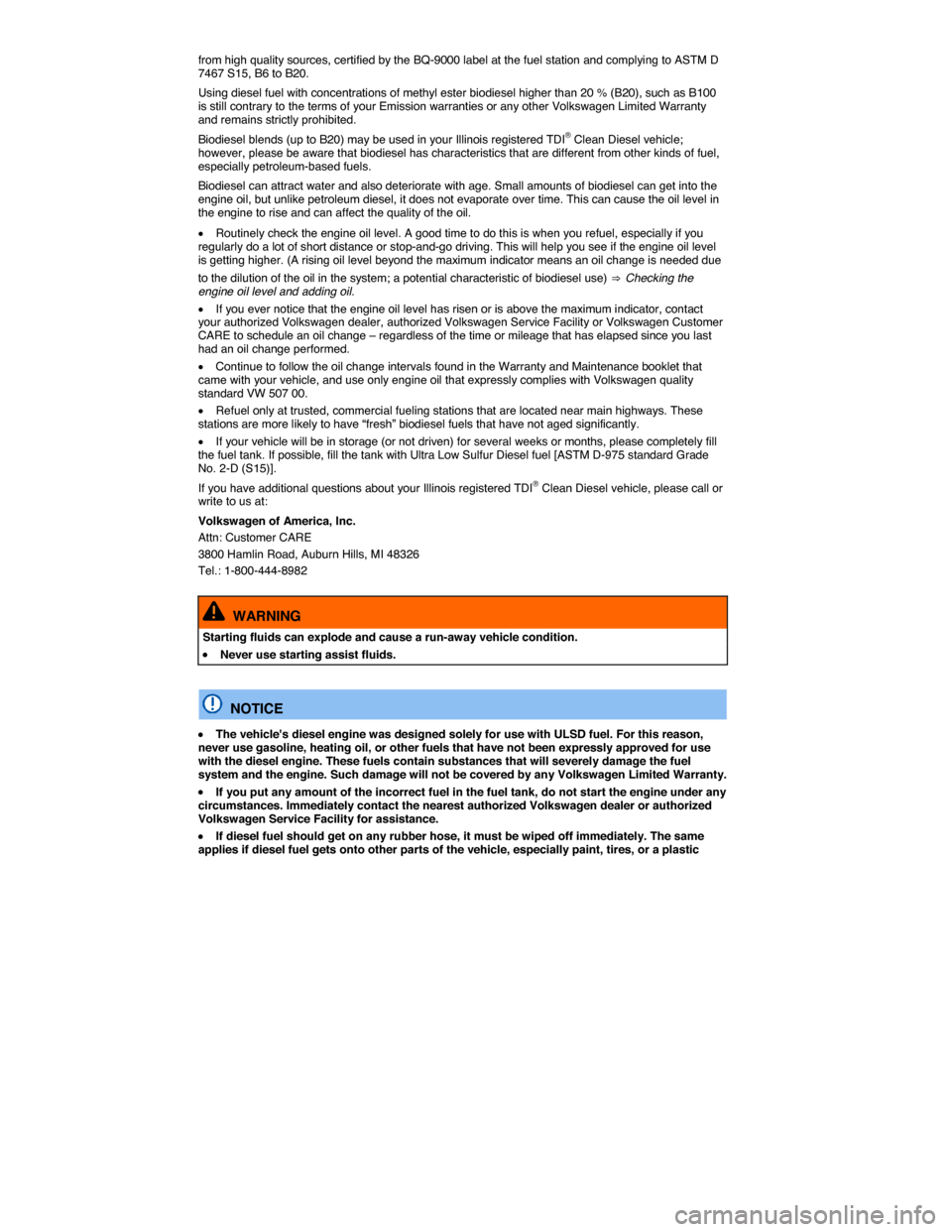
from high quality sources, certified by the BQ-9000 label at the fuel station and complying to ASTM D 7467 S15, B6 to B20.
Using diesel fuel with concentrations of methyl ester biodiesel higher than 20 % (B20), such as B100 is still contrary to the terms of your Emission warranties or any other Volkswagen Limited Warranty and remains strictly prohibited.
Biodiesel blends (up to B20) may be used in your Illinois registered TDI® Clean Diesel vehicle; however, please be aware that biodiesel has characteristics that are different from other kinds of fuel, especially petroleum-based fuels.
Biodiesel can attract water and also deteriorate with age. Small amounts of biodiesel can get into the engine oil, but unlike petroleum diesel, it does not evaporate over time. This can cause the oil level in the engine to rise and can affect the quality of the oil.
�x Routinely check the engine oil level. A good time to do this is when you refuel, especially if you regularly do a lot of short distance or stop-and-go driving. This will help you see if the engine oil level is getting higher. (A rising oil level beyond the maximum indicator means an oil change is needed due
to the dilution of the oil in the system; a potential characteristic of biodiesel use) ⇒ Checking the engine oil level and adding oil.
�x If you ever notice that the engine oil level has risen or is above the maximum indicator, contact your authorized Volkswagen dealer, authorized Volkswagen Service Facility or Volkswagen Customer CARE to schedule an oil change – regardless of the time or mileage that has elapsed since you last had an oil change performed.
�x Continue to follow the oil change intervals found in the Warranty and Maintenance booklet that came with your vehicle, and use only engine oil that expressly complies with Volkswagen quality standard VW 507 00.
�x Refuel only at trusted, commercial fueling stations that are located near main highways. These stations are more likely to have “fresh” biodiesel fuels that have not aged significantly.
�x If your vehicle will be in storage (or not driven) for several weeks or months, please completely fill the fuel tank. If possible, fill the tank with Ultra Low Sulfur Diesel fuel [ASTM D-975 standard Grade No. 2-D (S15)].
If you have additional questions about your Illinois registered TDI® Clean Diesel vehicle, please call or write to us at:
Volkswagen of America, Inc.
Attn: Customer CARE
3800 Hamlin Road, Auburn Hills, MI 48326
Tel.: 1-800-444-8982
WARNING
Starting fluids can explode and cause a run-away vehicle condition.
�x Never use starting assist fluids.
NOTICE
�x The vehicle's diesel engine was designed solely for use with ULSD fuel. For this reason, never use gasoline, heating oil, or other fuels that have not been expressly approved for use with the diesel engine. These fuels contain substances that will severely damage the fuel system and the engine. Such damage will not be covered by any Volkswagen Limited Warranty.
�x If you put any amount of the incorrect fuel in the fuel tank, do not start the engine under any circumstances. Immediately contact the nearest authorized Volkswagen dealer or authorized Volkswagen Service Facility for assistance.
�x If diesel fuel should get on any rubber hose, it must be wiped off immediately. The same applies if diesel fuel gets onto other parts of the vehicle, especially paint, tires, or a plastic
Page 458 of 620
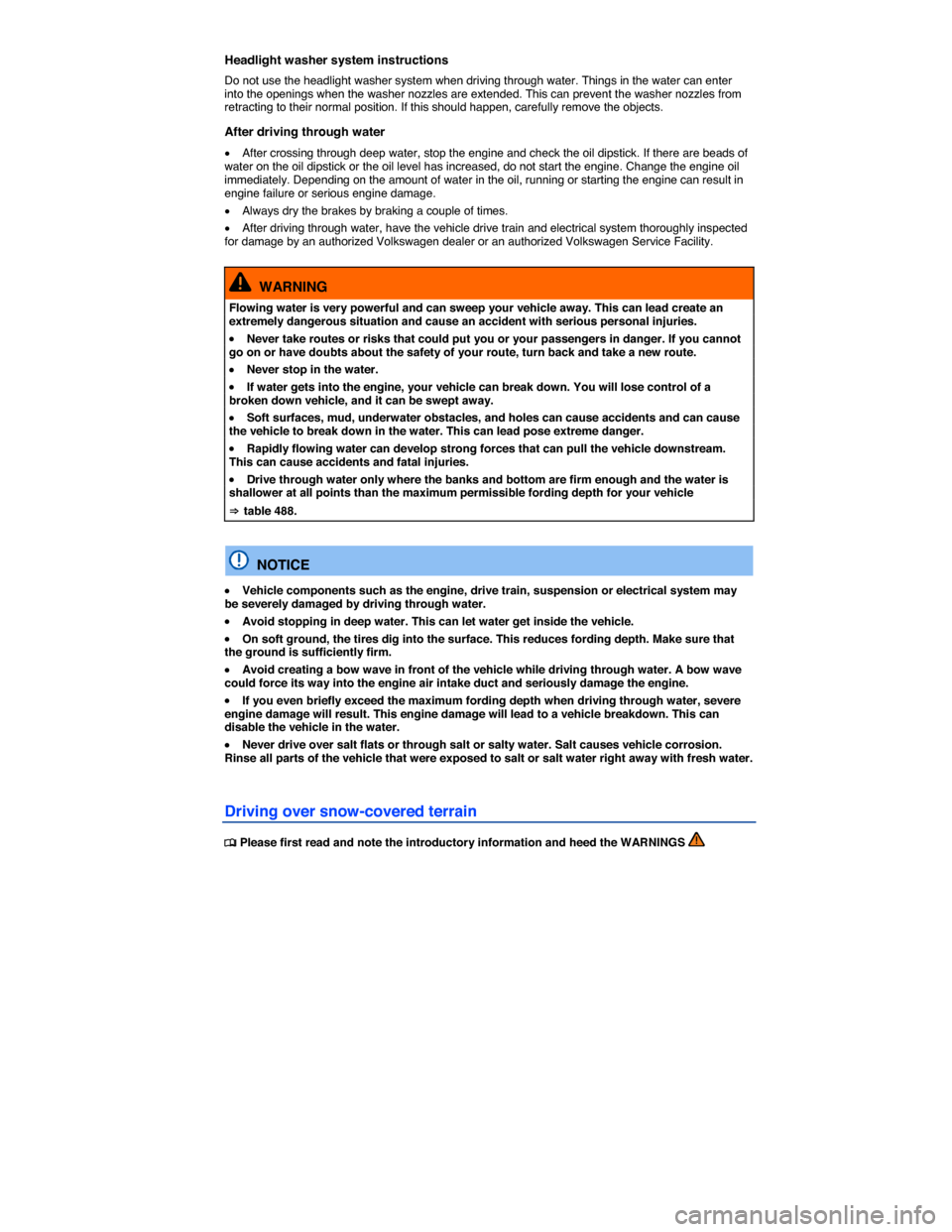
Headlight washer system instructions
Do not use the headlight washer system when driving through water. Things in the water can enter into the openings when the washer nozzles are extended. This can prevent the washer nozzles from retracting to their normal position. If this should happen, carefully remove the objects.
After driving through water
�x After crossing through deep water, stop the engine and check the oil dipstick. If there are beads of water on the oil dipstick or the oil level has increased, do not start the engine. Change the engine oil immediately. Depending on the amount of water in the oil, running or starting the engine can result in engine failure or serious engine damage.
�x Always dry the brakes by braking a couple of times.
�x After driving through water, have the vehicle drive train and electrical system thoroughly inspected for damage by an authorized Volkswagen dealer or an authorized Volkswagen Service Facility.
WARNING
Flowing water is very powerful and can sweep your vehicle away. This can lead create an extremely dangerous situation and cause an accident with serious personal injuries.
�x Never take routes or risks that could put you or your passengers in danger. If you cannot go on or have doubts about the safety of your route, turn back and take a new route.
�x Never stop in the water.
�x If water gets into the engine, your vehicle can break down. You will lose control of a broken down vehicle, and it can be swept away.
�x Soft surfaces, mud, underwater obstacles, and holes can cause accidents and can cause the vehicle to break down in the water. This can lead pose extreme danger.
�x Rapidly flowing water can develop strong forces that can pull the vehicle downstream. This can cause accidents and fatal injuries.
�x Drive through water only where the banks and bottom are firm enough and the water is shallower at all points than the maximum permissible fording depth for your vehicle
⇒ table 488.
NOTICE
�x Vehicle components such as the engine, drive train, suspension or electrical system may be severely damaged by driving through water.
�x Avoid stopping in deep water. This can let water get inside the vehicle.
�x On soft ground, the tires dig into the surface. This reduces fording depth. Make sure that the ground is sufficiently firm.
�x Avoid creating a bow wave in front of the vehicle while driving through water. A bow wave could force its way into the engine air intake duct and seriously damage the engine.
�x If you even briefly exceed the maximum fording depth when driving through water, severe engine damage will result. This engine damage will lead to a vehicle breakdown. This can disable the vehicle in the water.
�x Never drive over salt flats or through salt or salty water. Salt causes vehicle corrosion. Rinse all parts of the vehicle that were exposed to salt or salt water right away with fresh water.
Driving over snow-covered terrain
�
Page 470 of 620
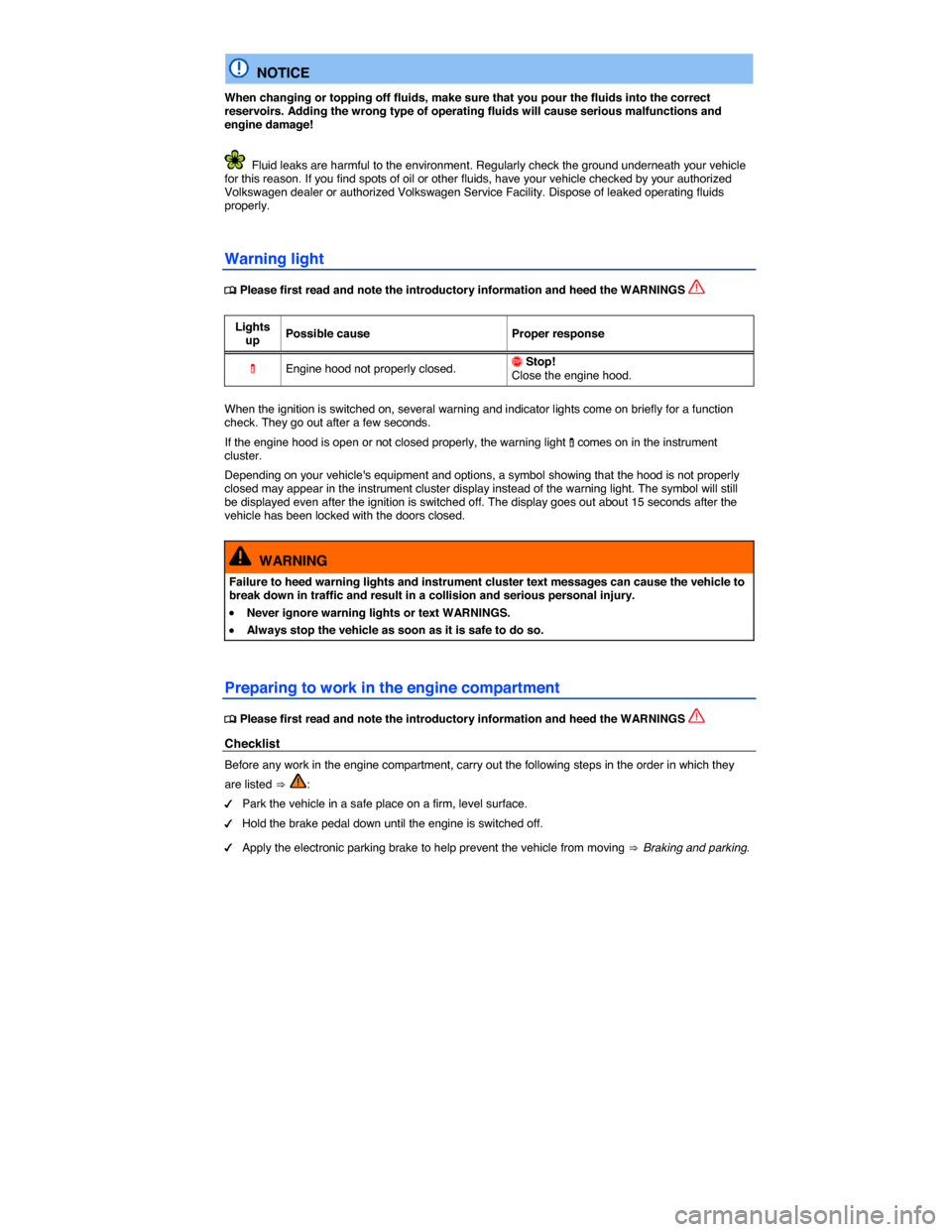
NOTICE
When changing or topping off fluids, make sure that you pour the fluids into the correct reservoirs. Adding the wrong type of operating fluids will cause serious malfunctions and engine damage!
Fluid leaks are harmful to the environment. Regularly check the ground underneath your vehicle for this reason. If you find spots of oil or other fluids, have your vehicle checked by your authorized Volkswagen dealer or authorized Volkswagen Service Facility. Dispose of leaked operating fluids properly.
Warning light
�
Page 476 of 620
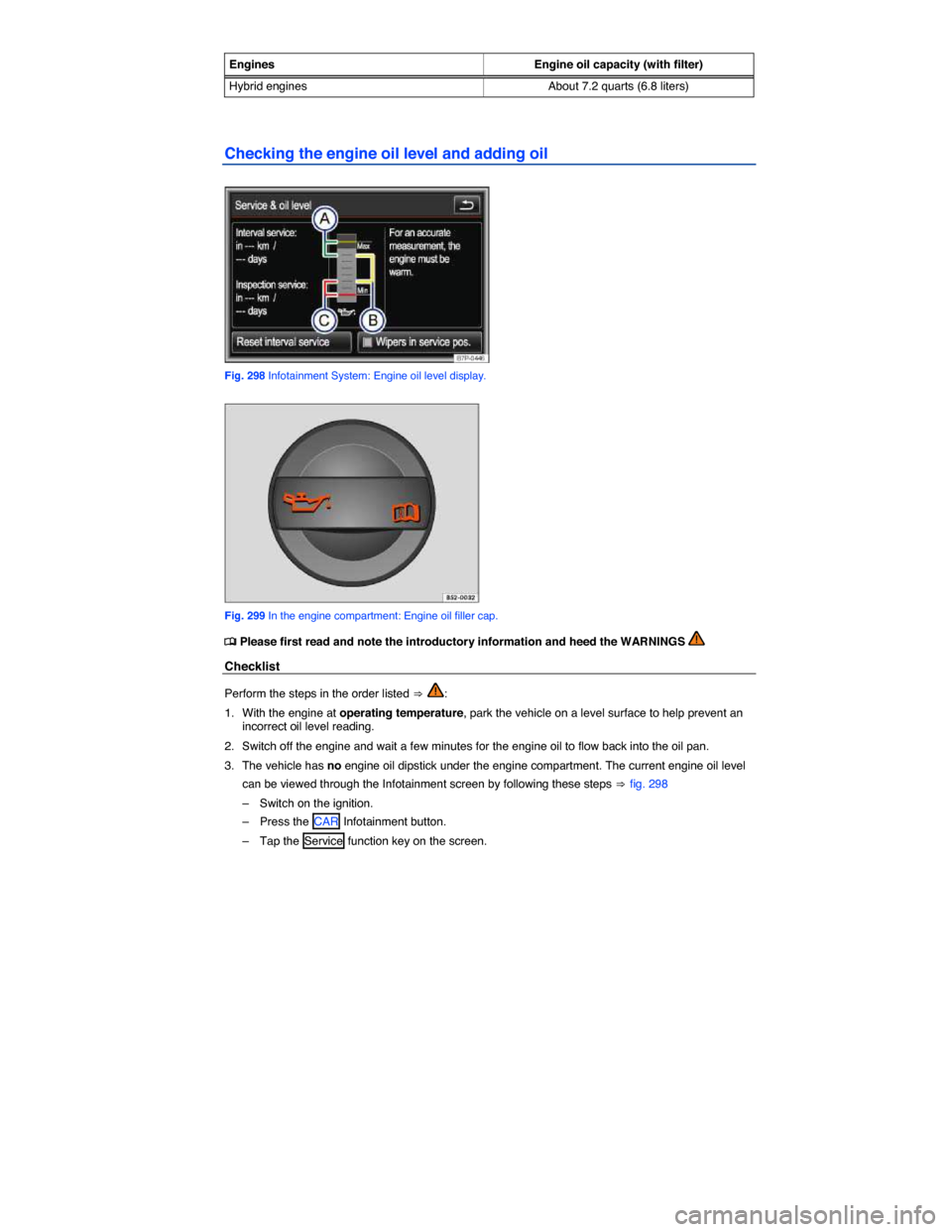
Engines Engine oil capacity (with filter)
Hybrid engines About 7.2 quarts (6.8 liters)
Checking the engine oil level and adding oil
Fig. 298 Infotainment System: Engine oil level display.
Fig. 299 In the engine compartment: Engine oil filler cap.
�
Page 506 of 620
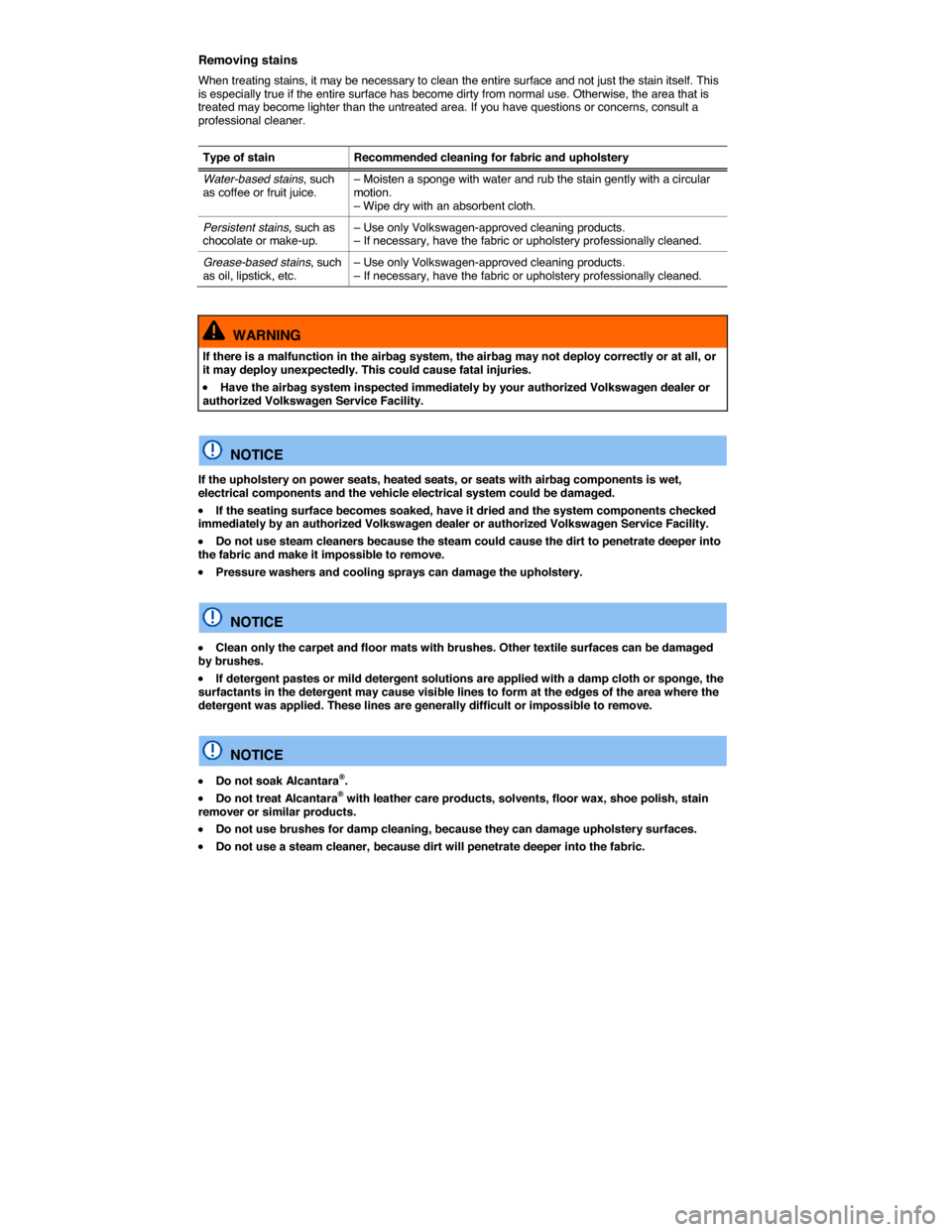
Removing stains
When treating stains, it may be necessary to clean the entire surface and not just the stain itself. This is especially true if the entire surface has become dirty from normal use. Otherwise, the area that is treated may become lighter than the untreated area. If you have questions or concerns, consult a professional cleaner.
Type of stain Recommended cleaning for fabric and upholstery
Water-based stains, such as coffee or fruit juice. – Moisten a sponge with water and rub the stain gently with a circular motion. – Wipe dry with an absorbent cloth.
Persistent stains, such as chocolate or make-up. – Use only Volkswagen-approved cleaning products. – If necessary, have the fabric or upholstery professionally cleaned.
Grease-based stains, such as oil, lipstick, etc. – Use only Volkswagen-approved cleaning products. – If necessary, have the fabric or upholstery professionally cleaned.
WARNING
If there is a malfunction in the airbag system, the airbag may not deploy correctly or at all, or it may deploy unexpectedly. This could cause fatal injuries.
�x Have the airbag system inspected immediately by your authorized Volkswagen dealer or authorized Volkswagen Service Facility.
NOTICE
If the upholstery on power seats, heated seats, or seats with airbag components is wet, electrical components and the vehicle electrical system could be damaged.
�x If the seating surface becomes soaked, have it dried and the system components checked immediately by an authorized Volkswagen dealer or authorized Volkswagen Service Facility.
�x Do not use steam cleaners because the steam could cause the dirt to penetrate deeper into the fabric and make it impossible to remove.
�x Pressure washers and cooling sprays can damage the upholstery.
NOTICE
�x Clean only the carpet and floor mats with brushes. Other textile surfaces can be damaged by brushes.
�x If detergent pastes or mild detergent solutions are applied with a damp cloth or sponge, the surfactants in the detergent may cause visible lines to form at the edges of the area where the detergent was applied. These lines are generally difficult or impossible to remove.
NOTICE
�x Do not soak Alcantara®.
�x Do not treat Alcantara® with leather care products, solvents, floor wax, shoe polish, stain remover or similar products.
�x Do not use brushes for damp cleaning, because they can damage upholstery surfaces.
�x Do not use a steam cleaner, because dirt will penetrate deeper into the fabric.
Page 526 of 620
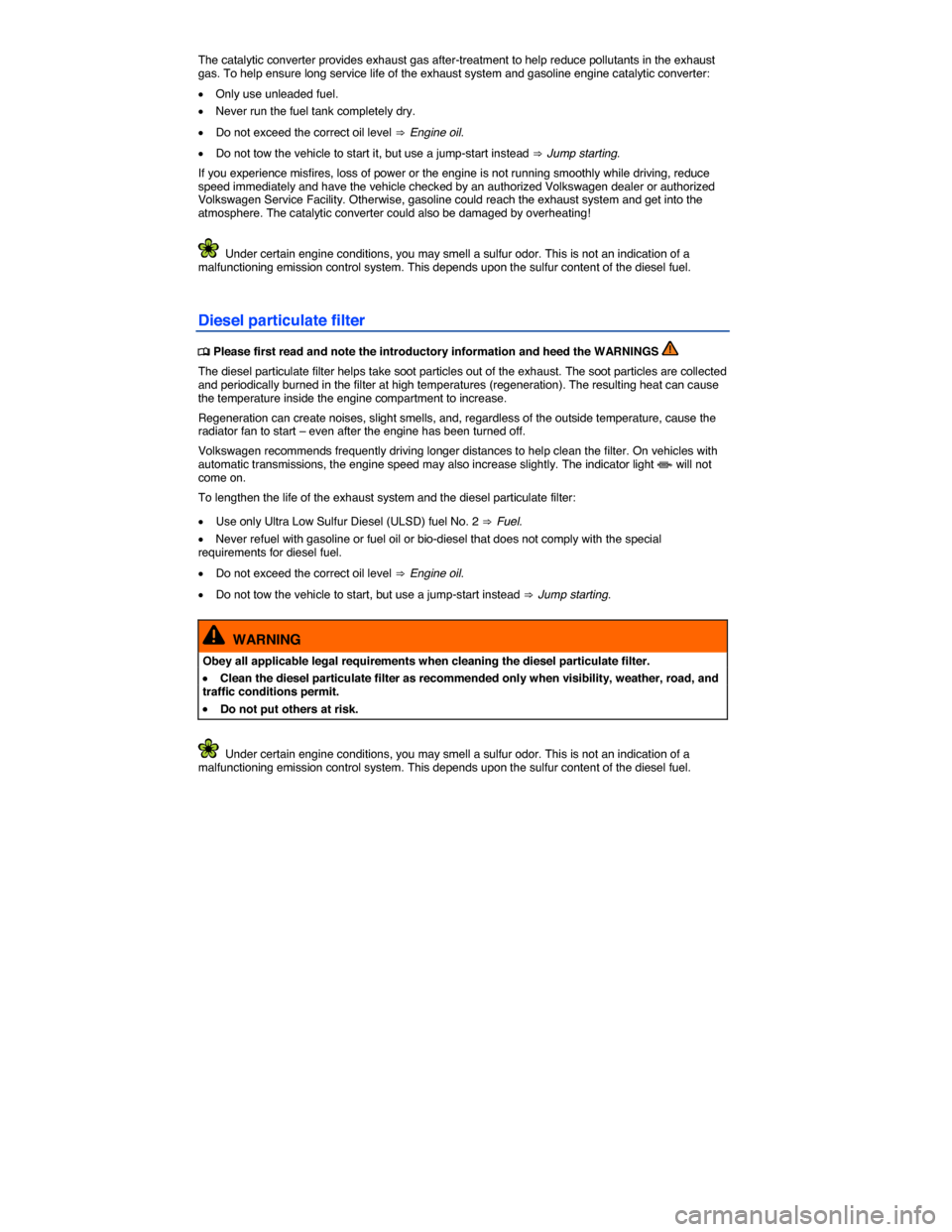
The catalytic converter provides exhaust gas after-treatment to help reduce pollutants in the exhaust gas. To help ensure long service life of the exhaust system and gasoline engine catalytic converter:
�x Only use unleaded fuel.
�x Never run the fuel tank completely dry.
�x Do not exceed the correct oil level ⇒ Engine oil.
�x Do not tow the vehicle to start it, but use a jump-start instead ⇒ Jump starting.
If you experience misfires, loss of power or the engine is not running smoothly while driving, reduce speed immediately and have the vehicle checked by an authorized Volkswagen dealer or authorized Volkswagen Service Facility. Otherwise, gasoline could reach the exhaust system and get into the atmosphere. The catalytic converter could also be damaged by overheating!
Under certain engine conditions, you may smell a sulfur odor. This is not an indication of a malfunctioning emission control system. This depends upon the sulfur content of the diesel fuel.
Diesel particulate filter
�
Page 547 of 620
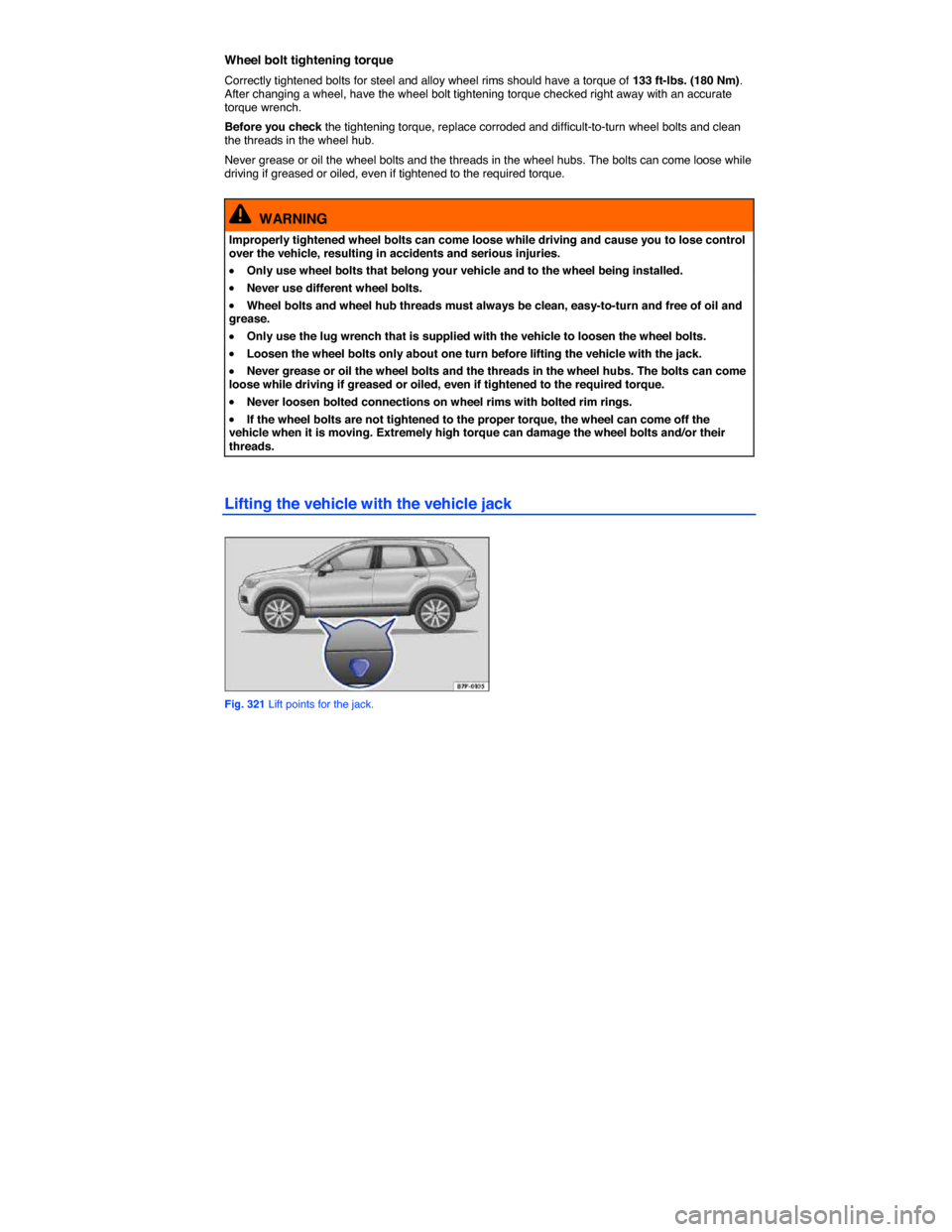
Wheel bolt tightening torque
Correctly tightened bolts for steel and alloy wheel rims should have a torque of 133 ft-lbs. (180 Nm). After changing a wheel, have the wheel bolt tightening torque checked right away with an accurate torque wrench.
Before you check the tightening torque, replace corroded and difficult-to-turn wheel bolts and clean the threads in the wheel hub.
Never grease or oil the wheel bolts and the threads in the wheel hubs. The bolts can come loose while driving if greased or oiled, even if tightened to the required torque.
WARNING
Improperly tightened wheel bolts can come loose while driving and cause you to lose control over the vehicle, resulting in accidents and serious injuries.
�x Only use wheel bolts that belong your vehicle and to the wheel being installed.
�x Never use different wheel bolts.
�x Wheel bolts and wheel hub threads must always be clean, easy-to-turn and free of oil and grease.
�x Only use the lug wrench that is supplied with the vehicle to loosen the wheel bolts.
�x Loosen the wheel bolts only about one turn before lifting the vehicle with the jack.
�x Never grease or oil the wheel bolts and the threads in the wheel hubs. The bolts can come loose while driving if greased or oiled, even if tightened to the required torque.
�x Never loosen bolted connections on wheel rims with bolted rim rings.
�x If the wheel bolts are not tightened to the proper torque, the wheel can come off the vehicle when it is moving. Extremely high torque can damage the wheel bolts and/or their threads.
Lifting the vehicle with the vehicle jack
Fig. 321 Lift points for the jack.
Page 553 of 620
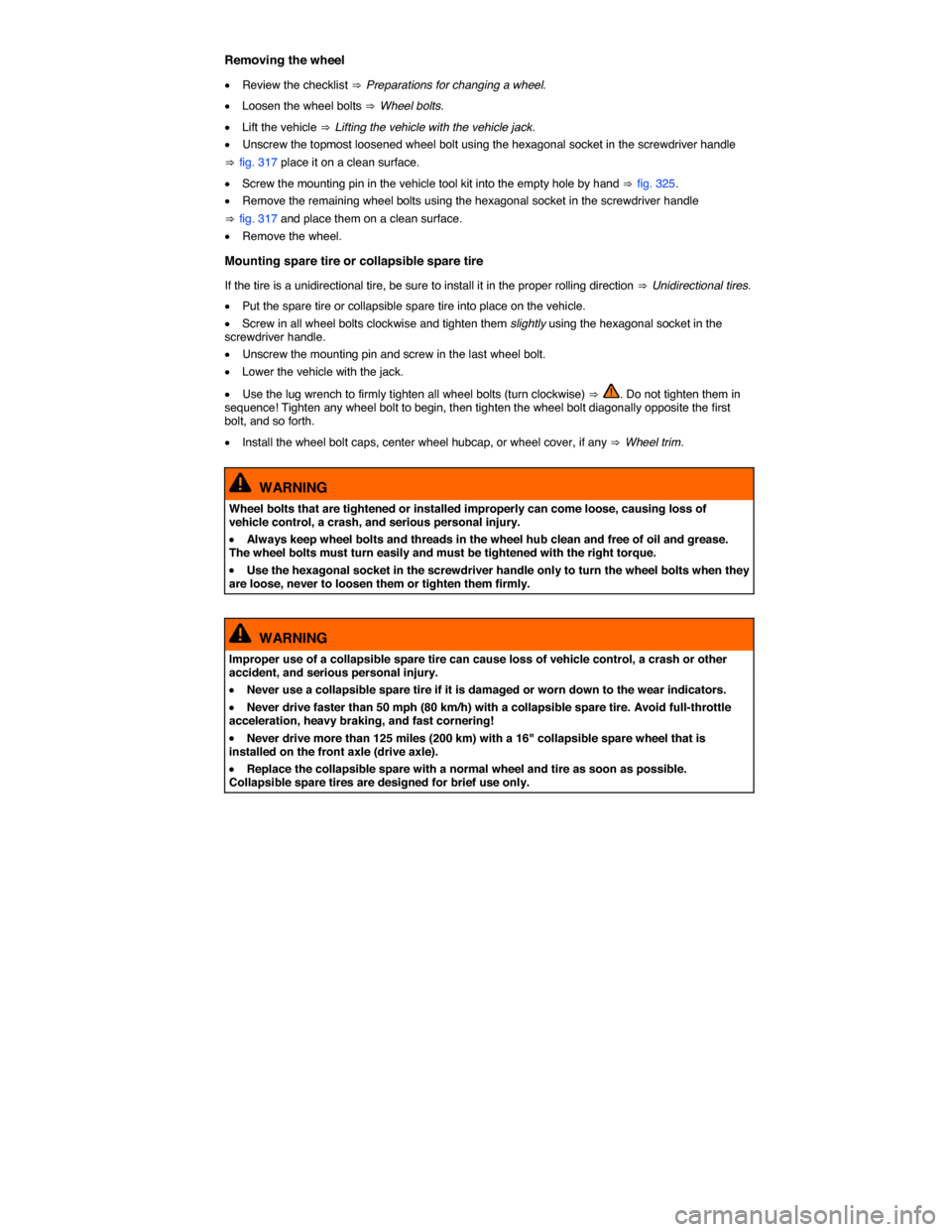
Removing the wheel
�x Review the checklist ⇒ Preparations for changing a wheel.
�x Loosen the wheel bolts ⇒ Wheel bolts.
�x Lift the vehicle ⇒ Lifting the vehicle with the vehicle jack.
�x Unscrew the topmost loosened wheel bolt using the hexagonal socket in the screwdriver handle
⇒ fig. 317 place it on a clean surface.
�x Screw the mounting pin in the vehicle tool kit into the empty hole by hand ⇒ fig. 325.
�x Remove the remaining wheel bolts using the hexagonal socket in the screwdriver handle
⇒ fig. 317 and place them on a clean surface.
�x Remove the wheel.
Mounting spare tire or collapsible spare tire
If the tire is a unidirectional tire, be sure to install it in the proper rolling direction ⇒ Unidirectional tires.
�x Put the spare tire or collapsible spare tire into place on the vehicle.
�x Screw in all wheel bolts clockwise and tighten them slightly using the hexagonal socket in the screwdriver handle.
�x Unscrew the mounting pin and screw in the last wheel bolt.
�x Lower the vehicle with the jack.
�x Use the lug wrench to firmly tighten all wheel bolts (turn clockwise) ⇒ . Do not tighten them in sequence! Tighten any wheel bolt to begin, then tighten the wheel bolt diagonally opposite the first bolt, and so forth.
�x Install the wheel bolt caps, center wheel hubcap, or wheel cover, if any ⇒ Wheel trim.
WARNING
Wheel bolts that are tightened or installed improperly can come loose, causing loss of vehicle control, a crash, and serious personal injury.
�x Always keep wheel bolts and threads in the wheel hub clean and free of oil and grease. The wheel bolts must turn easily and must be tightened with the right torque.
�x Use the hexagonal socket in the screwdriver handle only to turn the wheel bolts when they are loose, never to loosen them or tighten them firmly.
WARNING
Improper use of a collapsible spare tire can cause loss of vehicle control, a crash or other accident, and serious personal injury.
�x Never use a collapsible spare tire if it is damaged or worn down to the wear indicators.
�x Never drive faster than 50 mph (80 km/h) with a collapsible spare tire. Avoid full-throttle acceleration, heavy braking, and fast cornering!
�x Never drive more than 125 miles (200 km) with a 16" collapsible spare wheel that is installed on the front axle (drive axle).
�x Replace the collapsible spare with a normal wheel and tire as soon as possible. Collapsible spare tires are designed for brief use only.